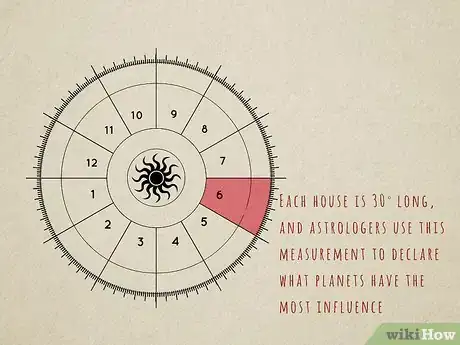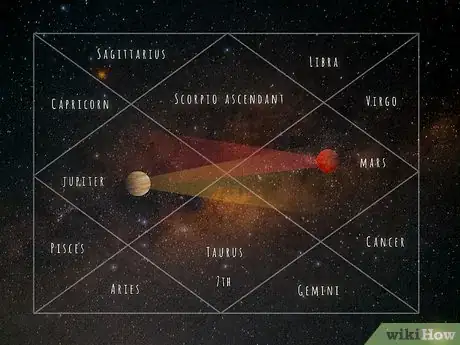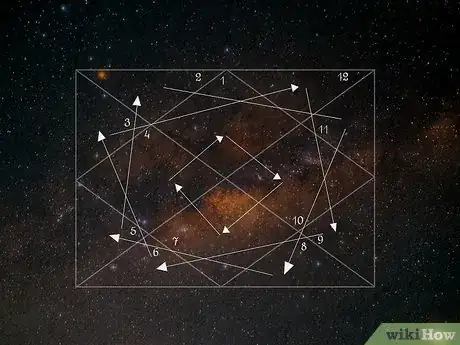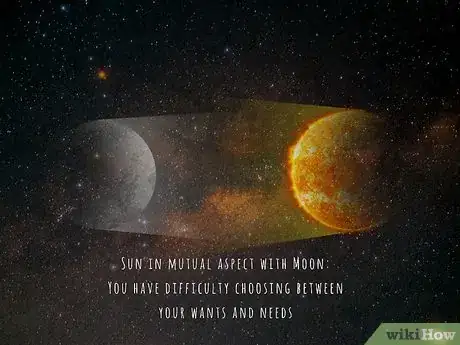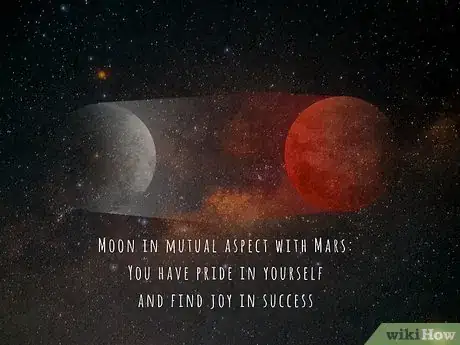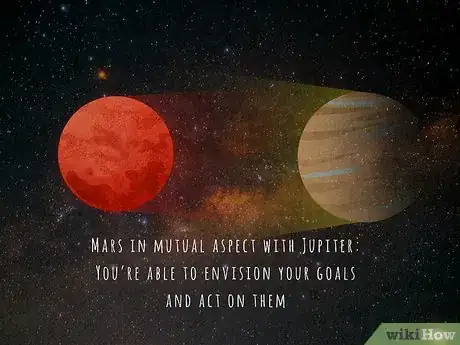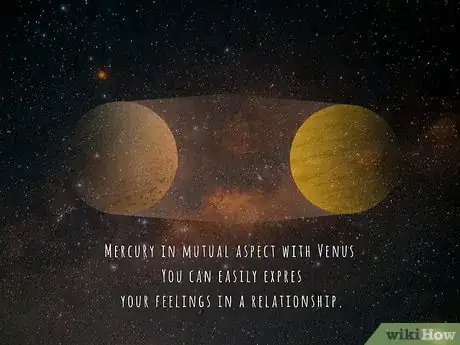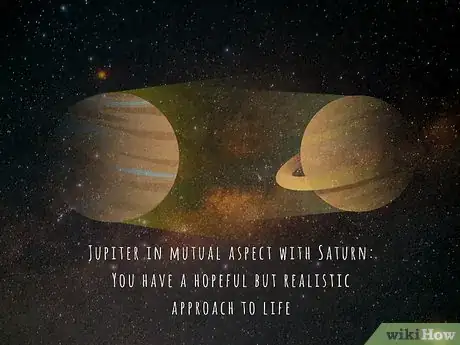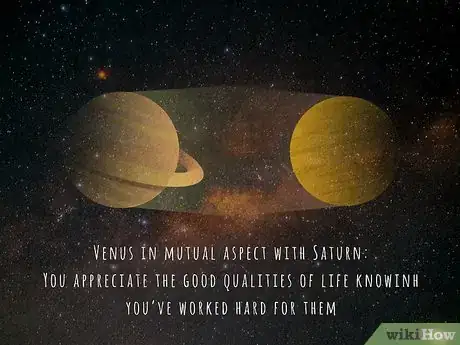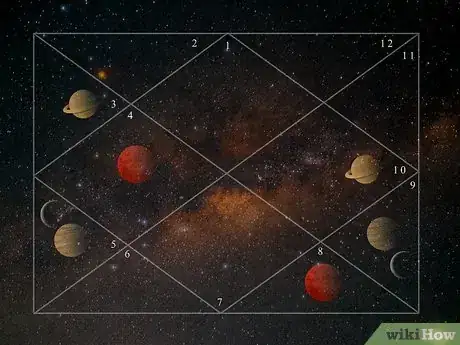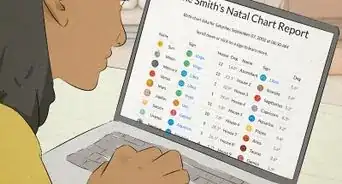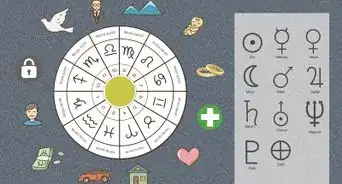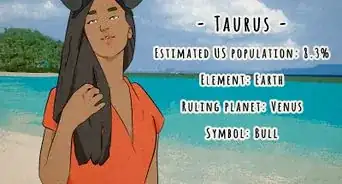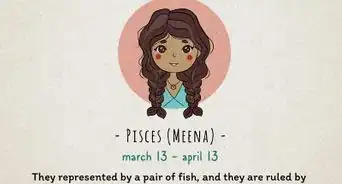This article was co-authored by Tara Divina and by wikiHow staff writer, Aly Rusciano. Tara Divina is a California-based Vedic Astrologer. Vedic Astrology, also known as Jyotish, is an ancient, sacred art of self-understanding and divination. With nearly 10 years of experience, Tara gives personalized readings that answer her clients' biggest questions about relationships, money, purpose, career, and other big life decisions.
There are 18 references cited in this article, which can be found at the bottom of the page.
This article has been viewed 12,603 times.
Did you know that the course of your life could be written in the stars? In Vedic astrology, astrologers use mutual aspects to interpret your horoscope. In a birth chart, the exchange of energy between planets, also known as "grahas" in Sanskrit, can influence personality and the future. If you’re curious about what mutual aspects and grahas say about you, keep reading because we’ve put together a comprehensive guide full of meanings and interpretations.
Steps
Interpreting Mutual Aspects by Planets (Grahas)
-
1Sun. This planet represents your ego and rules over you, ego, personal health, and vitality. How you present yourself to the world is directly influenced by the Sun, making it one of your core planets. When in a mutual aspect with other planets, your self-image and attitude may change.[4]
- Sun in mutual aspect with Moon: You have difficulty choosing between your wants and needs.[5]
- Sun in mutual aspect with Mars: You’re good at sports and can handle confrontation with ease.[6]
- Sun in mutual aspect with Mercury: You’re confident in academia and an effective communicator.
- Sun in mutual aspect with Jupiter: You're wise, studious, and enjoy presenting your ideas to others.
- Sun in mutual aspect with Venus: You’re naturally creative and appreciate the arts.
- Sun in mutual aspect with Saturn: You think deeply about yourself and your responsibility to the world.
- Sun in mutual aspect with Rahu: You’re somewhat passive and less enthusiastic about life.
- Sun in mutual aspect with Ketu: You’re humble and self-aware.
- All possible mutual aspects are covered once in this article.
-
2Moon. This planet governs your emotions and represents your hopes, wishes, and desires. Your self-worth and life goals are affected by the Moon. Because of this, planets in mutual aspect will influence your feelings, self-worth, and passions.
- Moon in mutual aspect with Mars: You have pride in yourself and find joy in success.
- Moon in mutual aspect with Mercury: You’re open about your feelings and value your emotions.
- Moon in mutual aspect with Jupiter: Your wisdom will help you live a long and happy life.[7]
- Moon in mutual aspect with Venus: You find comfort in wealth, luxury, and romantic relationships.
- Moon in mutual aspect with Saturn: Your determination and ambition to accomplish your goals.
- Moon in mutual aspect with Rahu: You understand what dreams are worth chasing.
- Moon in mutual aspect with Ketu: You second guess what you truly want in life.
-
3Mars. This is the planet of action, and it controls your drive and ambition. How you react to competition and confrontation is governed by the red planet. When Mars is in a mutual aspect with another planet, your impulses and intuition will be influenced.[8]
- Mars in mutual aspect with Mercury: You think reasonably before making decisions.
- Mars in mutual aspect with Jupiter: You’re able to envision your goals and act on them.
- Mars in mutual aspect with Venus: You act on your emotions without thinking.
- Mars in mutual aspect with Saturn: You responsibly pursue your dreams.
- Mars in mutual aspect with Rahu: You take time to slow down and rest.
- Mars in mutual aspect with Ketu: You often rethink your decisions.
-
4Mercury. This planet represents communication and intelligence. Logic, reasoning, and hard work are all driven by this planet. Because of this, a mutual aspect with Mercury will greatly influence your speech, writing, and intellectual expression.
- Mercury in mutual aspect with Jupiter: You’re innovative, practical, and wiser than your years.
- Mercury in mutual aspect with Venus: You can easily express your feelings in a relationship.
- Mercury in mutual aspect with Saturn: You’re diligent, practical, and productive.[9]
- Mercury in mutual aspect with Rahu: You often struggle in social situations.[10]
- Mercury in mutual aspect with Ketu: You must learn to think before you speak.[11]
-
5Jupiter. This is the planet of wisdom and represents your spiritual hope. Jupiter governs the ability to wish for bigger and greater things. When in a mutual aspect with another planet, your drive to learn new things and process experiences may be altered.[12]
- Jupiter in mutual aspect with Venus: You’re analytical in romantic relationships.
- Jupiter in mutual aspect with Saturn: You have a hopeful but realistic approach to life.[13]
- Jupiter in mutual aspect with Rahu: You think twice before acting on desires.
- Jupiter in mutual aspect with Ketu: You find learning new things challenging.
-
6Venus. The planet of love is all about passion and partnership. Venus represents beauty and an appreciation of the arts. A mutual aspect with this planet will influence your love life and standards.
- Venus in mutual aspect with Saturn: You appreciate the good qualities of life knowing you’ve worked hard for them.[14]
- Venus in mutual aspect with Rahu: You find romance and partnership challenging.
- Venus in mutual aspect with Ketu: You must learn to overcome obstacles in romantic relationships.[15]
-
7Saturn. Being the responsible planet, Saturn governs your determination and drive. How you serve yourself and others is at the forefront of this planet, making loyalty one of its driving factors. Planets in a mutual aspect with Saturn will influence your desire to achieve.
Expert Q&A
-
QuestionHow can you learn astrology?
 Tara DivinaTara Divina is a California-based Vedic Astrologer. Vedic Astrology, also known as Jyotish, is an ancient, sacred art of self-understanding and divination. With nearly 10 years of experience, Tara gives personalized readings that answer her clients' biggest questions about relationships, money, purpose, career, and other big life decisions.
Tara DivinaTara Divina is a California-based Vedic Astrologer. Vedic Astrology, also known as Jyotish, is an ancient, sacred art of self-understanding and divination. With nearly 10 years of experience, Tara gives personalized readings that answer her clients' biggest questions about relationships, money, purpose, career, and other big life decisions.
Vedic Astrologer It is better to learn astrology from a reputable teacher than a book. It is not possible to show many things in a book. There is a lot of subjectivity. So if you want to learn astrology, find someone who has plenty of experience teaching astrology and giving readings.
It is better to learn astrology from a reputable teacher than a book. It is not possible to show many things in a book. There is a lot of subjectivity. So if you want to learn astrology, find someone who has plenty of experience teaching astrology and giving readings. -
QuestionHow can you create your astrological chart?
 Tara DivinaTara Divina is a California-based Vedic Astrologer. Vedic Astrology, also known as Jyotish, is an ancient, sacred art of self-understanding and divination. With nearly 10 years of experience, Tara gives personalized readings that answer her clients' biggest questions about relationships, money, purpose, career, and other big life decisions.
Tara DivinaTara Divina is a California-based Vedic Astrologer. Vedic Astrology, also known as Jyotish, is an ancient, sacred art of self-understanding and divination. With nearly 10 years of experience, Tara gives personalized readings that answer her clients' biggest questions about relationships, money, purpose, career, and other big life decisions.
Vedic Astrologer You can use various apps or online chart generators to get your astrological chart. But their accuracy may vary.
You can use various apps or online chart generators to get your astrological chart. But their accuracy may vary.
References
- ↑ https://youtu.be/4JmZ-csG_Uw?t=39
- ↑ https://youtu.be/4JmZ-csG_Uw?t=240
- ↑ https://youtu.be/6Gi04yujJwM?t=328
- ↑ http://modernvedicastrology.com/planets
- ↑ https://cafeastrology.com/natal/sunmoonaspects.html
- ↑ https://www.astrolada.com/articles/planets-in-aspects/mars-sun-aspect-combust-mars.html
- ↑ https://www.ancientastrologytalks.com/result-of-aspects-of-different-planets-on-moon/
- ↑ http://modernvedicastrology.com/planets
- ↑ https://youtu.be/ynEq2g1pDaI?t=67
- ↑ https://timesofindia.indiatimes.com/astrology/planets-transits/what-is-rahu-how-to-reduce-malefic-effects-of-rahu/articleshow/79510254.cms
- ↑ https://www.vedanet.com/ketu-the-most-mysterious-and-powerful-of-planetary-influences/
- ↑ http://modernvedicastrology.com/planets
- ↑ https://youtu.be/9oek3yqcnVg?t=130
- ↑ https://youtu.be/ynEq2g1pDaI?t=284
- ↑ https://youtu.be/bZUjiCW0JLM?t=8
- ↑ https://youtu.be/ynEq2g1pDaI?t=722
- ↑ https://youtu.be/ynEq2g1pDaI?t=876
- ↑ http://www.theartofvedicastrology.com/?page_id=330
- ↑ https://youtu.be/4JmZ-csG_Uw?t=375
